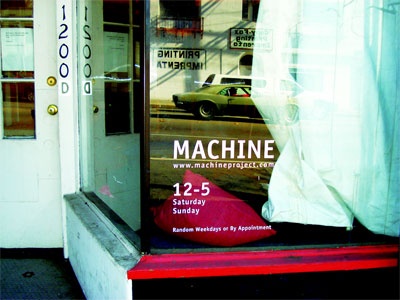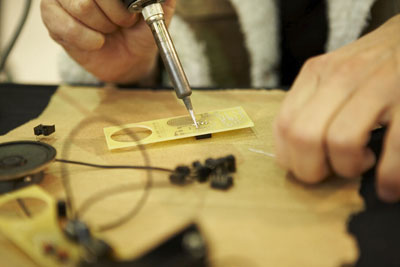
Machine Project, since its inception in 2003, has grown to become one of those mythic, playful and gloriously idiosyncratic spaces -- on the map alongside destinations such as the Museum of Jurassic Technology, the City Reliquary, or the Pirate Store at 826 Valencia. An interdisciplinary non-profit art space run out of a storefront in the Echo Park neighborhood of Los Angeles, Machine Project host events and exhibitions, which span lectures on the aesthetic cultivation of bacteria to a 3 day banjo performance in their front window. I interviewed founder Mark Allen about his involvement with the space and some of their upcoming projects. - Ceci Moss
How did you get started with Machine Project? Were you involved with other arts organization like this in the past?
I did two temporary, summer long 3 month art spaces in Houston. One called Revolution Summer in 1997 and one called LAX in 1998. I went to Cal Arts in 1997-99, then afterwards was a part of C-level. C-level was a collective art/new media space that was started by Eddo Stern in Chinatown Los Angeles. C-level dissolved in 2004 or 2005, but the space is still used by a spin off group called Betalevel lead by Jason Brown, who was part of C-level and is also on the board of Machine Project. I started Machine Project in 2003 after seeing the storefront that is our current location for rent while looking for an apartment.
Education is an important part of your mission -- Machine Project often sponsors workshops and classes. How did this emphasis in your programming come about?
While I was at Cal Arts, I became interested in electronics for a sculpture I was making. The experience of teaching myself electronics was pretty challenging. Afterwards, I started helping other people with their electronics projects and after a while I had enough people that I was helping as individuals that I decided to try offering a class, which I did at C-level. Also, while at graduate school, I worked as a TA for Hilary Kapan who taught me computer programming. The process of helping other people with their programming assignments was something I enjoyed and that I would like to think I was good at. So, I have a personal history in helping people learn technology.
The second part is that I often think of Machine Project as a pedagogical project disguised as an art project. Most/much of what we do can be viewed as various forms of education - lectures, peer-to-peer learning, informal learning, and workshops. I'm very interested in setting up ways that learning and education can be a large part of one's cultural life after one is done with formal education.
Finally, I have a certain stake in believing that it's important to provide people access to the tools which our reality is constructed by, that is systems of thought as well as technical frameworks.

I think your educational initiatives really speak to Machine Project's larger community focus- you often collaborate with local arts groups like Fallen Fruit, Sumi Ink Club, etc. to stage projects. Could you talk a bit about the arts community within which you work and how that feeds into your activities as a space?
I think this is one of the most exciting things about contemporary art practice in general and Los Angeles specifically is that a significant portion of artists are engaged in creating their own contexts for their cultural production. LA has a nice combination of relatively affordable commercial real estate (compared to NYC, for example) and a huge number of young artists because of all the art schools. We are currently experiencing a real explosion in artist-run initiatives. Within walking distance of Machine Project there are a number of great spaces - Tiny Creatures, 1830, Echo Curio, to name three. There is a network of sorts between lots of these projects - people are involved in multiple spots as participants, board members, audience, supporters, and collaborators.

Do you think Machine Project serves a particular niche within this community?
I think we are fairly unique in the degree to which our programming covers a very wide range of cultural practices from poetry to music to art to science to technology to oddball games and recreational activities. We are also in an interesting position in terms of infrastructure in that we have more structure than most artist-run spaces but less than the more formal non-profits such as LACE or the museums. One curatorial idea I have, which I think is very important, is we value sensibility over ideology and I think we've been successful at articulating our sensibility. In that, our audience may not be able to define what a Machine Project event is, but they recognize that thing when they see it. And we are enthusiasts! We serve the enthusiast niche!
Whether those enthusiasts include giant joystick enthusiasts, sea slugs enthusiasts, or cable untangling enthusiasts...That's a lot of ground to cover!
Yes, and they're often the same enthusiasts.
I've been thinking lately how much our programming is influenced by the way in which the internet has changed how people use information...That many people use the internet, wikipedia, etc. as a site of a dérive (in the sense used by the situationalists) to wander around different categories of knowledge and information as a form of entertainment. We like to take that way of experiencing knowledge and have it take place in a socially embodied community space.
-->I think that's a correct assessment- and you even see it extend into print publications such as Cabinet.
I have a great admiration for Cabinet. I am often struck by envy when I read the magazine, it infuriates me how great it is.
Machine Project's structure is unique in that it is truly so interdisciplinary. Do you think there's potential for this sort of format to reach into the bounds of larger arts institutions and museums? Or have you seen that happen already?
Yes, of course. The Hammer Museum here in Los Angeles does fantastic things with their public programming. I think we are in an ever more interdisciplinary era, so I assume that the cultural institutions will reflect that and do already.
What is going on at Machine Project right now? Are there any special projects in the near future that Rhizome readers should know about?
On November 15th we will be occupying LACMA, which is the largest museum in Los Angeles. We're doing over 60 projects spread throughout the entire campus, rather than going into depth on that I will instead give you the url. Smaller projects include a greenhouse warming party for the greenhouse we just installed in the basement and a four part musical by John Hogan, which starts this Sunday. The series details the "adventures of a group of Roman Catholic friars sent on a mission by the pope to convert the natives of The New World, but who find themselves instead on an island populated by Bacchus-worshipping women and a mysterious pan-sexual fish monster."
The LACMA project is interesting because it's a real transition from Machine Project operating as a venue to more of a collective art project. The curatorial team for that show was about 30 people, we all went over to LACMA, walked around the museum and dreamed up ideas.
Who made up the curatorial team?
Everyone on the team were people we had worked with before -- artists, writers, musicians. Some of the projects are interactive, but many of them are performative. We have a murder mystery that viewers can solve by collecting clues spread around the campus, ambient haircuts, musicians occupying the elevators, primitive synth construction workshops, a spot for napping, etc. The process of developing the ideas was interesting, as we ended up with some pieces that are definitely one person projects, but also a lot of ideas that no-one remembers who thought it up, so the authorship is a bit complex.
Musical Elevators Rehearsal #3 + Annie practices her LACMA Tour from machine project on Vimeo.
How long will the takeover last?
It's one day. It starts at noon and runs until 8pm in the museum, then we have a 2 hour video and live music show featuring Takeshi Murata, Lucky Dragons, Holliganship and more.
Any plans to document the event online for those who can't make it?
We are doing extensive video documentation, some of which is already online at the LACMA page on our site and then in may we have a book coming out that LACMA is publishing about the event which will cover the projects we did, and the projects we wanted to do but didn't. One of my favorite ideas we're not doing is making their valet parking a driving school, so you can have 16 year olds with their driver's permits learning to drive on other people's BMWs. I think Joshua Beckman came up with that idea.
That's hilarious!
I could go on all day about the projects that aren't happening...We're actually doing a limited edition letter press poster that is a sestina (a kind of poetic form) put together by Jason Brown of all the ideas were not doing. I wanted to swap all of MoCA's signage with all of LACMA's for just that day, but they didn't go for that either.
While I don't live in Los Angeles, I subscribe to your feed and I've been following your activities for awhile, you run a really great space, I'm excited to feature it on Rhizome. Thank you so much for taking the time to speak to me about Machine Project.
Thanks!

